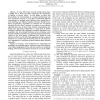Free Online Productivity Tools
i2Speak
i2Symbol
i2OCR
iTex2Img
iWeb2Print
iWeb2Shot
i2Type
iPdf2Split
iPdf2Merge
i2Bopomofo
i2Arabic
i2Style
i2Image
i2PDF
iLatex2Rtf
Sci2ools
126
click to vote
ICDE
2010
IEEE
2010
IEEE
Optimal load shedding with aggregates and mining queries
— To cope with bursty arrivals of high-volume data, a DSMS has to shed load while minimizing the degradation of Quality of Service (QoS). In this paper, we show that this problem can be formalized as a classical optimization task from operations research, in ways that accommodate different requirements for multiple users, different query sensitivities to load shedding, and different penalty functions. Standard nonlinear programming algorithms are adequate for non-critical situations, but for severe overloads, we propose a more efficient algorithm that runs in linear time, without compromising optimality. Our approach is applicable to a large class of queries including traditional SQL aggregates, statistical aggregates (e.g., quantiles), and data mining functions, such as k-means, naive Bayesian classifiers, decision trees, and frequent pattern discovery (where we can even specify a different error bound for each pattern). In fact, we show that these aggregate queries are special in...
Related Content
| Added | 17 May 2010 |
| Updated | 17 May 2010 |
| Type | Conference |
| Year | 2010 |
| Where | ICDE |
| Authors | Barzan Mozafari, Carlo Zaniolo |
Comments (0)

